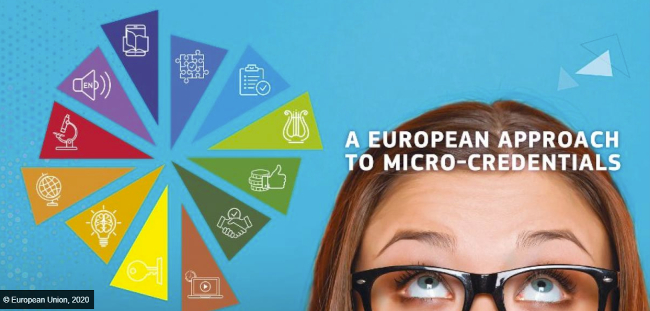The European Commission wishes to hear the views of citizens, governmental and non-governmental organisations (international, European, national, regional and local) as well as of education, training and employment stakeholders on the subject of EU-wide recognition of learning outcomes.
They can respond to the public consultation in a personal or organisational/institutional capacity by filling a the questionnaire. Registered stakeholder organisations can also submit a position paper.
The European Commission is preparing a proposal for a Council Recommendation on micro-credentials for lifelong learning and employability. This survey aims to collect the views of individuals and stakeholders on this initiative.
Within Europe a growing number of people need to update their knowledge, skills and competences to fill the gap between their formal education and the needs of a fast-changing knowledgedevelopment society and labour market.
The recovery from the COVID-19 crisis and the green and digital transitions require people to upskill or reskill, to maintain and acquire the competences that enable them to participate in society, ensure their personal, social and professional empowerment. Short learning courses and experiences are developing rapidly across Europe by a wide variety of public and private stakeholders, in response to the need for more flexible, learner-centred forms of provision of education and training. The potential role of and the interest in credentials that certify the outcomes of these short learning experiences is thus increasing. This is what is termed ‘micro-credentials’. Micro-credentials allow for a targeted acquisition of skills and competences, adapted to a fast changing society and labour market, while not replacing traditional qualifications. However, the value of micro-credentials is not always clear, due to a lack of standards for quality and transparency.
The initiative aims to develop a common definition and European standards for quality, transparency, cross-border comparability, recognition and portability, for any awarding body, by building on existing tools, as far as possible. More flexible and modular learning pathways and a larger take-up of micro-credentials will serve social, economic and pedagogical innovation for all purposes (employability, personal development, active ageing in the digital age, etc.). This will contribute to more inclusive education systems and smoother labour market transitions.
For more information and to fill out the questionaire, go here: Micro Credentials Public Consultation




Recent Comments